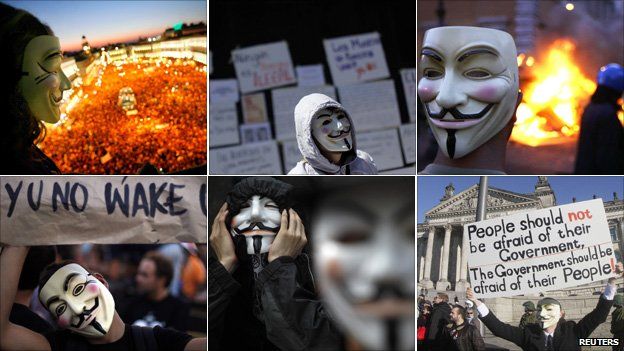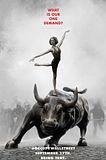Remember, remember! The Fifth of November, the Gunpowder Treason and plot;
I know of no reason why the Gunpowder Treason should ever be forgot!
 So the poem starts that commemorates the Gun Powder Plot of 1605 and Guy Fawkes, a member of the Gunpowder Plot, was arrested while guarding explosives the plotters had placed beneath the House of Lords. That night has been celebrated in England on November 5th as Guy Fawkes Night ever since with bonfires and masks inspired by Guy Fawkes’ image. The holiday, the poem and, especially, the mask was made popular again by the 2006 motion picture “V for Vendetta.” Set in the future, “V” is an anonymous masked revolutionary working to destroy the fascist, totalitarian government with elaborate, violent, and intentionally theatrical campaign that kills the leaders of the government and inspires the people to take back self-rule.
So the poem starts that commemorates the Gun Powder Plot of 1605 and Guy Fawkes, a member of the Gunpowder Plot, was arrested while guarding explosives the plotters had placed beneath the House of Lords. That night has been celebrated in England on November 5th as Guy Fawkes Night ever since with bonfires and masks inspired by Guy Fawkes’ image. The holiday, the poem and, especially, the mask was made popular again by the 2006 motion picture “V for Vendetta.” Set in the future, “V” is an anonymous masked revolutionary working to destroy the fascist, totalitarian government with elaborate, violent, and intentionally theatrical campaign that kills the leaders of the government and inspires the people to take back self-rule.
The mask was adopted by the group Anonymous whose members wore the mask during a 2008 protest of the Church of Scientology. The group has been called “freedom fighters,” “digital Robin Hoods,” “a cyber lynch-mob” and “cyber terrorists.” Whatever you call them they were named of Time‘s “100 most influential people in the world for 2012.

The masks are from the 2006 film V for Vendetta where one is worn by an enigmatic lone anarchist who, in the graphic novel on which it is based, uses Fawkes as a role model in his quest to end the rule of a fictional fascist party in the UK.Early in the book V destroys the Houses of Parliament by blowing it up, something Fawkes had planned and failed to do in 1605.
British graphic novel artist David Lloyd is the man who created the original image of the mask for a comic strip written by Alan Moore. Lloyd compares its use by protesters to the way Alberto Korda’s famous photograph of Argentine revolutionary Che Guevara became a fashionable symbol for young people across the world.
“The Guy Fawkes mask has now become a common brand and a convenient placard to use in protest against tyranny – and I’m happy with people using it, it seems quite unique, an icon of popular culture being used this way,” he says.
A curious Lloyd visited the Occupy Wall Street protest in Zuccotti Park, New York, to have a look at some of the people wearing his mask.
“My feeling is the Anonymous group needed an all-purpose image to hide their identity and also symbolise that they stand for individualism – V for Vendetta is a story about one person against the system.”
The film of V for Vendetta ends with an image of a crowd of Londoners all wearing Guy Fawkes masks, unarmed and marching on parliament.
It is that image of collective identification and simultaneous anonymity that is appealing to Anonymous and other groups, says Rich Johnston, a commentator on the world of comics.
 It also became a symbol of the Occupy Wall Street movement that raised the awareness of the world to social and economic inequality, greed, corruption and the undue influence of corporations on government, especially Wall Street. Their slogan “We Are the 99%” became the probably the best known phrase of the last 2 years and the mask one of the most recognized symbols of the movement next to the dancer on the Wall Street bull.
It also became a symbol of the Occupy Wall Street movement that raised the awareness of the world to social and economic inequality, greed, corruption and the undue influence of corporations on government, especially Wall Street. Their slogan “We Are the 99%” became the probably the best known phrase of the last 2 years and the mask one of the most recognized symbols of the movement next to the dancer on the Wall Street bull.
This Guy Fawkes Day is being remembered Anonymous with day long protests and actions around the world with a call to action to the people to take back their self rule from the corrupt governments and corporations. Battered and scarred, they are still here but the time for revolution is ripening.
This 5th of November, Anonymous will take to the streets in hundreds of cities around the world in its annual Million Mask March. The collective has coordinated this global event with thousands of participants since 2012.
The message for this year’s Million Mask March is building a better future through collective action. While individual participants may have different ideas about what a better future looks like, they will be demonstrating together in support of Anonymous’ methods and the continued ability for people to congregate under their banner and take actions anonymously.
Anonymous has accomplished much in its seven year tenure as an unorthodox activist network. Beginning with its protests against the Church of Scientology, which united tens of thousands of hackers, trolls, writers, activists, artists, and internet denizens against an international organization accused of serious human rights abuses and strong arm tactics against critics, Anonymous branched out to other causes in the 2010s. Their familiar Guy Fawkes masks were a potent symbol in the fight against Internet censorship, when members of Polish parliament donned paper masks in solidarity with protesters. Anonymous has led the charge in defense of WikiLeaks, opposing Internet filtering in Australia and the UK, and against wholesale data collection in the US. The collective has played key supporting roles in uprisings from Brazil and Hong Kong to the Philippines and Tunisia, and was an early supporter of the Occupy movement.
Anonymous has no leaders or formal membership, and it is not uncommon for different factions of the collective to actively oppose one another. What makes Anonymous work is its relentless pursuit of the best ideas, regardless of who may have had the thought. Anonymous exists without race, gender, religion, nationality, or ego. It acts where other groups cannot or will not, and gets results. This November, Anonymous invites the world to “mask up” and join the movement. This 5th of November, Anonymous will take to the streets in hundreds of cities around the world in its annual Million Mask March. The collective has coordinated this global event with thousands of participants since 2012. The message for this year’s Million Mask March is building a better future through collective action. While individual participants may have different ideas about what a better future looks like, they will be demonstrating together in support of Anonymous’ methods and the continued ability for people to congregate under their banner and take actions anonymously. Anonymous has accomplished much in its seven year tenure as an unorthodox activist network. Beginning with its protests against the Church of Scientology, which united tens of thousands of hackers, trolls, writers, activists, artists, and internet denizens against an international organization accused of serious human rights abuses and strong arm tactics against critics, Anonymous branched out to other causes in the 2010s. Their familiar Guy Fawkes masks were a potent symbol in the fight against Internet censorship, when members of Polish parliament donned paper masks in solidarity with protesters. Anonymous has led the charge in defense of WikiLeaks, opposing Internet filtering in Australia and the UK, and against wholesale data collection in the US. The collective has played key supporting roles in uprisings from Brazil and Hong Kong to the Philippines and Tunisia, and was an early supporter of the Occupy movement. Anonymous has no leaders or formal membership, and it is not uncommon for different factions of the collective to actively oppose one another. What makes Anonymous work is its relentless pursuit of the best ideas, regardless of who may have had the thought. Anonymous exists without race, gender, religion, nationality, or ego. It acts where other groups cannot or will not, and gets results. This November, Anonymous invites the world to “mask up” and join the movement.
